155 Results
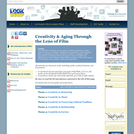
The objectives of this kit are to improve student perceptions of older adults in terms of creativity, flexibility and competence, and to broaden their understanding of what constitutes "creative" expression. Both documentary and feature films were used in order to explore the differences in intent between these different media, as well as the issues of time period, race, gender, culture and nationality.
- Subject:
- Arts and Humanities
- Material Type:
- Activity/Lab
- Diagram/Illustration
- Lesson Plan
- Reading
- Teaching/Learning Strategy
- Unit of Study
- Provider:
- Ithaca College
- Provider Set:
- Project Look Sharp
- Author:
- Sox Sperry
- Date Added:
- 04/30/2013
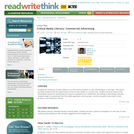
By looking at advertising and mass media critically, students begin to understand how the media oppresses certain groups, convinces people to purchase certain products, and influences culture.
- Subject:
- English Language Arts
- Material Type:
- Activity/Lab
- Lesson Plan
- Provider:
- ReadWriteThink
- Provider Set:
- ReadWriteThink
- Date Added:
- 09/30/2013
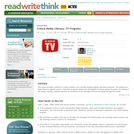
By critically analyzing popular television programs, students develop an awareness of the messages that are portrayed through the media.
- Subject:
- English Language Arts
- Material Type:
- Activity/Lab
- Lesson Plan
- Provider:
- ReadWriteThink
- Provider Set:
- ReadWriteThink
- Date Added:
- 09/30/2013
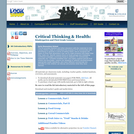
This kit provides teachers and other educators with the materials to help young children begin to understand the purpose of TV commercials (and advertising in general) in terms of selling intent, and to recognize the types of tricks that advertisers may use to make products look better than they really are. Specific lessons focus on foods groups and misleading nutritional messages commonly found in children's TV commercials, especially the "complete breakfast shot" and highly sugared pseudo-fruit snacks and beverages. Lessons are designed to address developmentally appropriate health standards, and many different commercials are provided so that children can discuss and practice what they have learned.
- Subject:
- Life Science
- Nutrition
- Material Type:
- Activity/Lab
- Diagram/Illustration
- Lesson Plan
- Teaching/Learning Strategy
- Unit of Study
- Provider:
- Ithaca College
- Provider Set:
- Project Look Sharp
- Author:
- Cyndy Scheibe & Jane Koestler
- Date Added:
- 05/08/2013
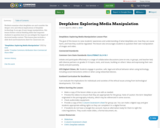
Students examine what deepfakes are and consider the deeper civic and ethical implications of deepfake technology. In an age of easy image manipulation, this lesson fosters critical thinking skills that empower students to question how we can mitigate the impact of doctored media content. This lesson plan includes a slide deck and brainstorm sheet for classroom use.
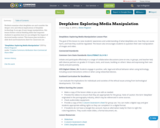
Students examine what deepfakes are and consider the deeper civic and ethical implications of deepfake technology. In an age of easy image manipulation, this lesson fosters critical thinking skills that empower students to question how we can mitigate the impact of doctored media content. This lesson plan includes a slide deck and brainstorm sheet for classroom use.
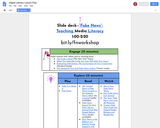
Hyperdoc playlist of activities for digital literacy lesson. Teacher will need to populate the "Guided Practice" section with updated links to current events. Check out The Sift from the News Literacy Project to get ides.
- Subject:
- English Language Arts
- Reading Informational Text
- Material Type:
- Homework/Assignment
- Interactive
- Lesson
- Lesson Plan
- Author:
- Crystal Hurt
- Date Added:
- 06/19/2018
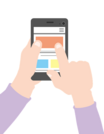
In this unit students will reflect on their own media environment, understand how cognitive bias and social media algorithms influence that environment, and learn how to investigate new sources and claims online. These activities culminate in a student-led "social science fair" MisinfoNight event where they present their new skills and knowledge to family members to help them become more savvy information consumers.
- Subject:
- English Language Arts
- Journalism
- Material Type:
- Lesson
- Unit of Study
- Author:
- Liz Crouse
- Shawn Lee
- Date Added:
- 07/29/2022
The information revolution of the 21st century is as significant and transformative as the industrial revolution of the 19th century. In this unit, students – and by proxy their families – will learn about the challenges of our current information landscape and how to navigate them. This unit is split into four modules. These modules can be done sequentially or stand on their own, depending on students’ needs and teachers’ timeframes. In this module (1 of 4), students analyze their own use of online social media platforms and learn how filter bubbles and confirmation bias shape the content of their media environment.
- Subject:
- English Language Arts
- Information Science
- Journalism
- Material Type:
- Module
- Unit of Study
- Author:
- Liz Crouse
- Shawn Lee
- Date Added:
- 03/08/2020
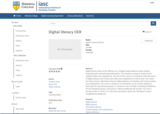
Digital literacy refers to the effective use of digital media platforms when finding, evaluating and communicating information. This involves a variety of technical and cognitive skills and competencies. The aim of this course is to introduce three key facets of digital literacy and increase your skills and competencies in these areas.
The course has three lessons: Information literacy
Digital wellness and identity
Communication and collaboration
This course is shared as an OER which can be reused, adapted or built upon for educational purposes.
- Subject:
- Education
- Higher Education
- Material Type:
- Assessment
- Full Course
- Provider:
- Hibernia College
- Author:
- Ann Byrne
- Emberley Davey
- Irene O'Dowd
- Date Added:
- 10/26/2023

Edmonds School District in Washington State implemented a district-wide media literacy support project during the 2022-2023 school year. This is a collection of the resources that came out of that project that other districts might find useful.
- Subject:
- Information Science
- Material Type:
- Unit of Study
- Author:
- Lesley James
- Leighanne Law
- Date Added:
- 09/27/2023
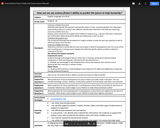
Students will learn the potential costs and benefits of social media, digital consumption, and our relationship with technology as a society in the three-week lesson. This inquiry based unit of study will answer the following questions:
Essential Question: How can we use science fiction’s ability to predict the future to help humanity?
Supportive Questions 1: What predictions of future development has science fiction accurately made in the past? This can include technology, privacy, medicine, social justice, political, environmental, education, and economic.
Supportive Question 2: What predictions for future development in contemporary science fiction are positive for the future of humanity? What factors need to begin in your lifetime to make these predictions reality?
Supportive Question 3: What predictions for future development in contemporary science fiction are negative for the future of humanity? What factors need to begin in your lifetime to stop these negative outcomes?
- Subject:
- Education
- Material Type:
- Homework/Assignment
- Lesson
- Reading
- Unit of Study
- Author:
- Morgen Larsen
- Date Added:
- 07/13/2020

Description: Don’t be fooled by food messaging is a media literacy embedded health unit that takes the health goals of maintaining a healthy lifestyle and adds some critical thinking skills and communication skills. In food marketing young people are surrounded by persuasive claims meant to influence and manipulate their eating behavior. Students will explore some of the techniques and strategies food marketers use to influence their eating behavior to better understand how it impacts their own food choices. Within the PE program students will discuss how food choices, levels of consumption and physical activity levels influence health and wellness. Body image/healthy weight will be incorporated into this content. The culminating projects require students to work collaboratively to synthesize their new learning while using a variety of strategies to create their own healthy choices messaging production projects.
- Subject:
- English Language Arts
- Marketing
- Nutrition
- Material Type:
- Activity/Lab
- Game
- Lesson
- Module
- Unit of Study
- Author:
- Shawn Sheller
- Barbara Soots
- Kimberlee Swan
- Julie Cantrell
- Jill Minkiewitz
- Mark Friden
- Kirsten Lewandowski
- Date Added:
- 04/01/2020

This lesson plan is geared for social studies, but can also be used in other content areas.
Media is a powerful agent in informing us and influencing social norms in our society. In this lesson plan, students learn about how to critically consume daily information and entertainment by listening to experts in media literacy. This lesson covers concepts like media ownership, framing and spin, source, agenda, bias, contextually misleading content and misinformation and disinformation.
Students also explore how media can affect livelihoods. They’ll study how Japanese American communities all along the west coast including in Washington state were impacted by media coverage leading into Japanese American incarceration in the 1940s and through redress and reparations in the early 1980s.
- Subject:
- Business and Communication
- History
- Journalism
- Social Science
- U.S. History
- Material Type:
- Lesson
- Lesson Plan
- Unit of Study
- Author:
- Yuko Kodama
- Date Added:
- 07/24/2023
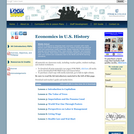
Economics in U.S. History is comprised of seven lessons and is designed to introduce students to basic economic concepts through analyzing diverse perspectives on the subject. Students will be engaged in a dynamic, interactive, and constructivist process of exploring media representations of economic issues in U.S. history. Such issues include the free market, industrialization, and The Living Wage Campaign. The kit will teach students to identify the Ě_Ě_ÝlanguageĚ_Ě_ĺ of construction of different media forms and to analyze and evaluate the meaning of mediated messages about economics. This kit was designed for 8th grade U.S. history, but the document-decoding approach can be adapted for and used from middle school through high school.
- Subject:
- Arts and Humanities
- Economics
- History
- Social Science
- U.S. History
- Material Type:
- Activity/Lab
- Diagram/Illustration
- Homework/Assignment
- Lesson Plan
- Reading
- Teaching/Learning Strategy
- Unit of Study
- Provider:
- Ithaca College
- Provider Set:
- Project Look Sharp
- Author:
- Chris Sperry
- Cindy Kramer
- Date Added:
- 05/09/2013
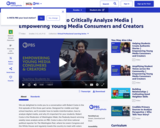
Designed for middle and high school teachers, we’ll consider how to tackle misinformation, how to analyze digital media, and why it’s important for your students. Robert Costa is the Moderator of Washington Week, the Peabody Award-winning weekly news analysis series on PBS. Costa is also a full-time national political reporter for The Washington Post, where he covers Congress and the White House and regularly travels the country to meet with voters and elected officials.
Led by PBS Digital Innovator All Star Leigh Herman and PBS Station Representative Mary Anne Lane this session highlights exciting resources and models that you can immediately implement in your classroom.
Prioritizing fun, engaging and accessible tools for your students, the series will highlight techniques for analyzing media, and amplifying student voice through authentic storytelling.
- Subject:
- English Language Arts
- Speaking and Listening
- Material Type:
- Lesson
- Provider:
- PBS LearningMedia
- Author:
- PBS Learning Media
- Date Added:
- 01/31/2023
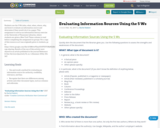
Students use the 5 Ws (who, what, when, where, why, and how) to evaluate an information source and determine if they would cite it in a paper. This assignment is used as an information literacy exercise at the University of Tennessee Libraries, where students are given a New York Times column to read before completing the assignment in groups.
For a copy of this resource as it was originally given to students, go to: https://drive.google.com/file/d/0B0vtrPDaeiV6VFJUYUNzRGlfb00/view?usp=sharing. Results of the use of this activity were shared in an article published in the journal Reference & User Services Quarterly 53, no. 4 (Summer 2014): 334-347.
- Subject:
- Arts and Humanities
- Business and Communication
- Education
- Social Science
- Material Type:
- Activity/Lab
- Homework/Assignment
- Date Added:
- 01/04/2017

With so many people getting their news from their social media newsfeed, how can they evaluate what is good and what might be fake? With the help of a Youtube video on the subject, student do some evaluating. This lesson is part of a media unit curated at our Digital Citizenship website, "Who Am I Online?"
- Subject:
- Communication
- Reading Informational Text
- Material Type:
- Activity/Lab
- Lesson Plan
- Author:
- John Sadzewicz
- Dana John
- Beth Clothier
- Angela Anderson
- Date Added:
- 06/19/2020

